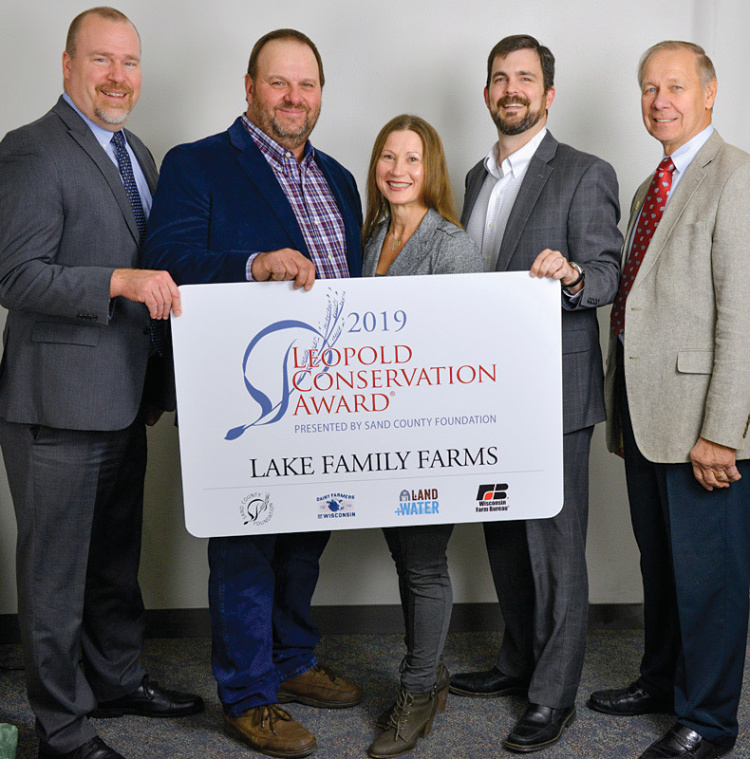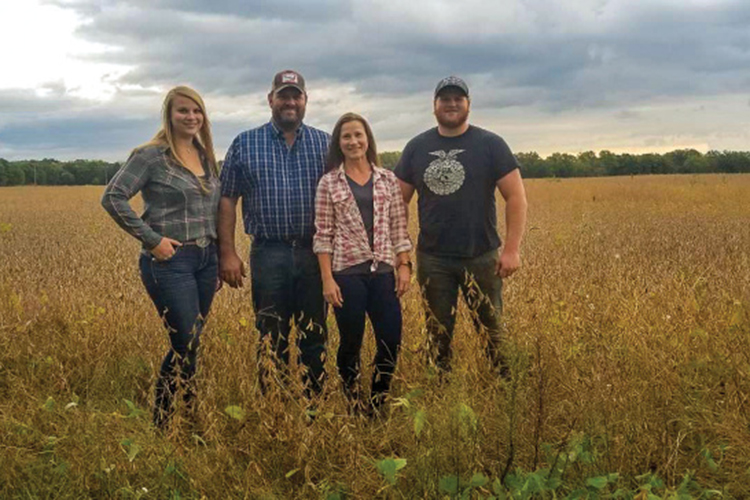Home > Wisconsin > Wisconsin Environment > Lake Family Farms Receives Wisconsin Leopold Conservation Award
Lake Family Farms Receives Wisconsin Leopold Conservation Award
In partnership with: Wisconsin Department of Agriculture, Trade and Consumer Protection.

Jeff Lake says receiving the Wisconsin Leopold Conservation Award is like winning “a farming Oscar.” Besides the signature crystal statuette, the award comes with a $10,000 check and is awarded annually to a deserving farm that exemplifies dedication to management of land, water and wildlife habitat.
Jeff’s operation, Lake Family Farms, located in Dunn County, received the agricultural accolade in 2019. Like many others, the farm has transitioned from dairy to producing corn and soybeans and selling meat locally from a small beef herd. What really sets them apart, however, is their stewardship of the soil, water and wildlife habitat on their land – and their advocacy for spreading the word about just how important that is.
See more: How Wisconsin Farms Found Success Collaborating for Conservation
Although he grew up on his family’s dairy farm near Boyceville, Jeff never planned to be a producer. After Jeff’s dad retired from dairy, he turned to row crops. Jeff’s brother, nephew and Jeff himself pitched in to help with planting and harvesting – while operating a mechanic business. When both Jeff’s dad and nephew passed away unexpectedly in 2006, Jeff became a full-time farmer.
“He closed his business and just dove in headfirst,” says Jeff’s wife, Kelley.
In his early years as the farm’s decision-maker, Jeff started seeing changes in the land he’d never seen before – washouts in new areas, earthworms that had seemingly disappeared. In response, Jeff started experimenting with no-till and cover crops to improve soil quality. “We were just kind of playing around a bit to see what happened,” he recalls.

Experiments and Epiphanies
His epiphany moment came when he rented a nearby field where water just wouldn’t infiltrate the soil. “I put cover crop in and let it grow all year,” Jeff says. “The next spring, buying into the no-till method, I planted into thigh-high clover. A lot of people thought I was goofy, but that summer when the corn came up showing through the clover, that ground had basically turned into potting soil. I thought, ‘Oh, boy, we got something going on here.’”
He began to ask questions wherever he could – neighbors, the Natural Resources Conservation Service, Wisconsin Land and Water Conservation Association, the Hay River Watershed group, the University of Wisconsin, and others. Through them, he learned about software that would identify a farm’s unprofitable and environmentally sensitive areas.
Today Lake Family Farms, which includes Jeff and Kelley’s children, April and Jake, has experimented with nearly 20 different cover crops. Jeff’s tried various methods of planting cover crop seed into standing row crops. He’s developed buffer strips on his 1,500-acre property near the branches of the Hay River, which help limit erosion and serve as habitat for deer, turkey and pollinators.
See more: Wisconsin Program Preserves Farmland and Promotes Conservation
Leading by Example
The more he learned, the more he realized just how much his parents’ and grandparents’ way of thinking had influenced him. “Our philosophy was, you take care of the land and it will take care of you,” Jeff says. Conservationist Aldo Leopold, namesake of the Leopold Conservation Award, would have been a kindred spirit. Leopold wrote the influential book, “A Sand County Almanac,” advancing the idea of a “land ethic” where conservation and production should have a symbiotic relationship.
“Jeff and his family are taking this land ethic and embodying it in everything they do to improve the land for the next generation,” says Lance Irving, national director for the Leopold Conservation Award program of the Sand County Foundation. “He’s rallied other farmers and landowners and leads by example.”



